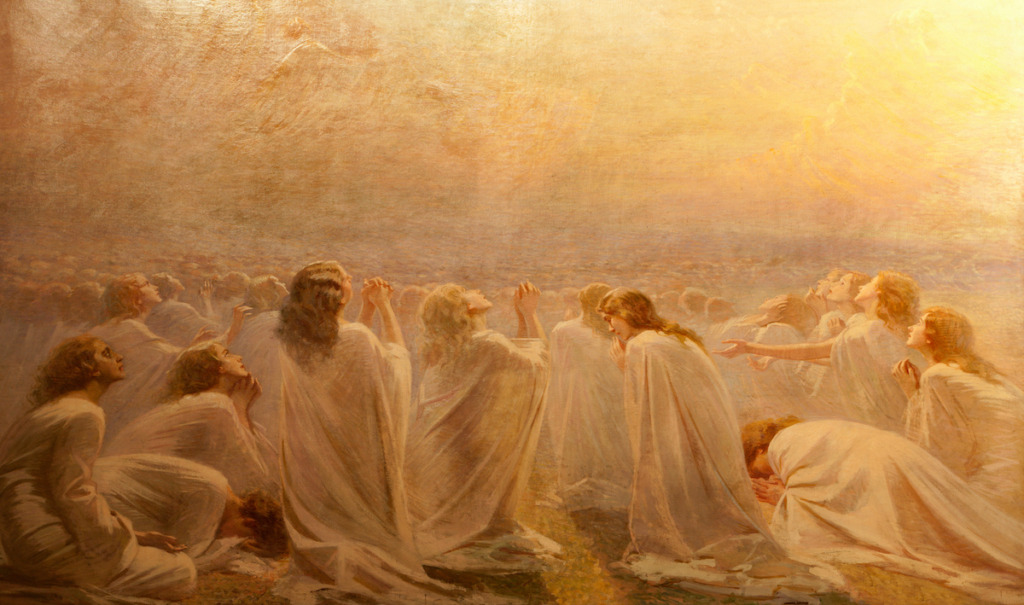Question:
I’m confused about the Catholic teaching on purgatory, as we never really covered it in our RCIA program. I understand it to be a “stopover” of sorts, for a soul’s purification on its way to heaven, but I’ve also been told different things as to the nature of this purification — anything from a final confession to a burning off of sins to a witnessing of harm the person may have caused while still alive and of which they may have not previously been aware.
I’ve also been told that a person’s purgatory time can start in the here and now, while still alive, and even that some of the suffering in this life may be to help others already in purgatory. Finally, I’ve been told that almost everyone will likely go to purgatory. Can you comment? (Charlottesville)
Answer:
The Catholic Church has always believed in the existence of purgatory. That belief is defined in the Catechism of the Catholic Church, which says: “All who die in God’s grace and friendship, but still imperfectly purified, are indeed assured of their eternal salvation; but after death they undergo purification, so as to achieve the holiness necessary to enter the joy of heaven” (No. 1030).
It is also reflected in the words of Jesus himself, who says in the Gospel of Matthew (12:32), that certain sins “will not be forgiven, either in this age or in the age to come,” which serves as an indication that some purging of the soul may need to occur after death.
There are indications from the earliest centuries of the Christian era that this belief was common in the Church; some might remember that St. Monica, in the fourth century, asked her son St. Augustine before she died to continue to remember her soul in his Masses.
Even before the advent of Christianity, we read in the Second Book of Maccabees (12:46) that Judas Maccabeus “made atonement for the dead” that they might be freed from sin, which suggest a Jewish practice of offering prayers to cleanse the souls of the departed.
And yes, it has always been the common practice of believers who are still living to offer prayers and sacrifices for the departed. (Older Catholics might remember when they were little and complained to their mothers about something, the response would be, “Offer it up for the souls in purgatory?”)
As for the exact nature of what that purification after death may be, we just don’t know. It might even be instantaneous. And regarding your speculation as to what percentage will wind up in purgatory, we’ve never been told; but speaking personally, spiritual and moral perfection seem a long way away, so my own guess is that a lot of us will need some remediation.
Question:
Our current priest always looks exhausted. He is attempting to pastor three parishes that were merged into one. Our parish has no deacons. With the shortage of priests and deacons, will the Church ever allow women to become deacons? (Evansville, Indiana)
Answer:
This same issue, in fact, is currently being studied by the Church. In April 2020, the Vatican announced that Pope Francis had created a new commission to study the question of a female diaconate in the Catholic Church. This followed the suggestion by the 2019 Synod of Bishops on the Amazon, which had recommended that women be considered for certain ministries in the Church, including the permanent diaconate.
An earlier study on the same topic had been commissioned by Pope Francis in August 2013, soon after his election as pontiff. At a 2016 meeting with the women’s International Union of Superiors General, Pope Francis told the sisters that his understanding at that point was that women described as deaconesses in the New Testament were not ordained, as permanent deacons are, but were commissioned to assist with baptism by immersion of other women.
In 2019, aboard a papal flight with journalists, Pope Francis told reporters that the first commission he had appointed to study the topic had not reached a unanimous conclusion. “What is fundamental is that there was no certainty that there was an ordination with the same form and the same aim as the ordination of men,” the pope told reporters on that May 7, 2019, flight from Macedonia to Rome.
In 2002, the same topic had been studied by the International Theological Commission, an advisory body to the Vatican’s Congregation for the Doctrine of the Faith, which had cast some doubt as to whether female deacons in the early Church had a liturgical or sacramental function.
So the creation in 2020 of this new commission has given new hope to some that the ordination of women deacons could someday happen.
Question:
Do Catholic priests forget what they are told in confession? (City and state withheld)
Answer:
Yes, we do. Part of that is due, I’m sure, to the grace of God; but another reason might be the repetitive nature of most confessions. I always try to remind myself, when I enter the confessional box, to stay alert and to remember that my role is to put the penitent in touch with God.
Rather than have confession become simply a repetition of regular faults (and that is fine), I often try to engage penitents also with regard to their spiritual life by asking them, for example, “Do you try to pray each day?” Normally, within a few minutes of leaving the confessional, I have forgotten nearly all of the sins people have confessed.

